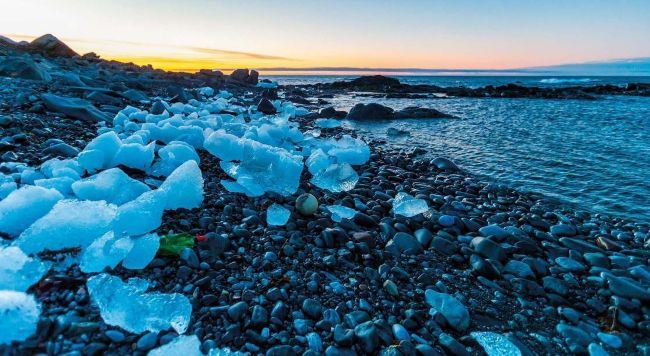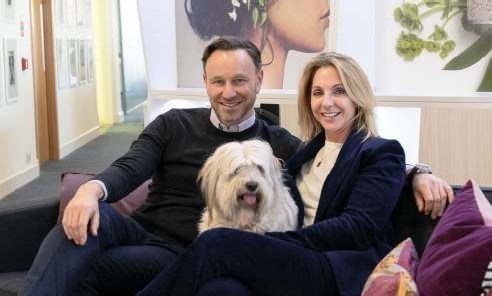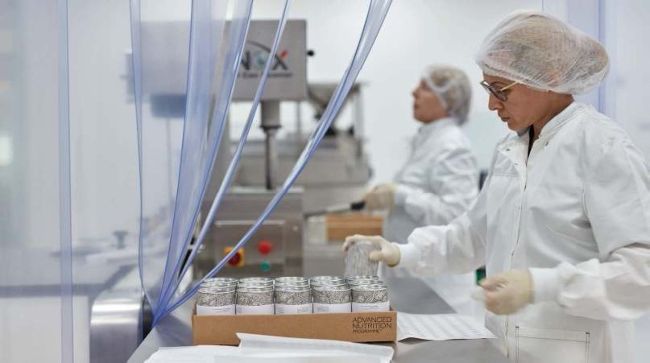Winds of CHANGE
As the International Institute for Anti-Ageing (IIAA) celebrates its 25th anniversary, founder David Alpert talks about the company’s eco ethos and why the beauty industry needs to invest in more sustainable practices to help reduce plastic waste
David Alpert

Plastic waste in the Arctic
The International Institute for Anti-Ageing (IIAA) is celebrating 25 years in the beauty industry, rising from a small distribution company to one of the sector’s leading names, distributing advanced skincare brand Environ, mineral make-up range Jane Iredale, and its own brand, Advanced Nutrition Programme (ANP) supplements, to thousands of salons. The company has made a name for itself not only for its quality brands but for its strong eco ethos, which is important at a time when the Government is moving towards a bigger sustainability drive in all industries.
Company founder David Alpert talks us through the business’s eco practices and reveals what needs to be done by larger beauty corporations and high-street salons alike to reduce our impact on the environment.

David Alpert with wife and IIAA co-founder Tracy Tamaris
Why is sustainability such a hot topic in the beauty industry?
Our industry is responsible for billions of single-use packaging items per annum. I visited the Artic last summer, as I have a passion for photography, and on the shore line 10 degrees from the North Pole was tons of plastic packaging, and a lot of it was from big beauty brands.
It really brought home the fact that we need to address this issue because what we’re doing as an industry is not sustainable. If we don’t look after the environment it will reach a point of no return.
What can salons do to become more eco-friendly?
It starts with a change of mindset. Start small – for example, looking at your cleaning fluids to check they’re bio-friendly and making sure staff switch off computers at night to reduce electrical use – and then build it up. Salons should also be demanding more from their suppliers in terms of sustainable packaging. For example, many salons put homecare products in paper bags for clients to take away but the rope handle may be made from plastic, not natural fibres – these are the things you need to ask about. When you give a bag, it should be 100% biodegradable.

images of IIAA’s packing plant and packaging
What sustainable business practices does IIAA have in place?
As a distributor, we supply products to thousands of salons and these businesses deal with tens of thousands of clients, which gives us the opportunity to influence a broad range of people and really get the sustainability message out there.
We have an internal “green team” that meets monthly to look at what we can do to make the business more sustainable and we’ve done a lot already – using corn starch chips instead of foam ones when packaging up goods because they dissolve away to nothing after a few minutes in water; only using recycled paper and vegetable ink when printing because it doesn’t present a problem for the environment; and changing shipping from air freight to sea freight to massively reduce our carbon footprint.
However, the biggest project was building our packing plant in 2017 so we could switch all of ANP’s plastic packaging to recycled paper cartons. This was unique because no one else in the industry was doing anything like it, and now we’re looking at moving towards creating recyclable paper packet vitamin refills that can be poured into the cardboard pots, further reducing waste.
We’re also working with other beauty organisations through industry body the Beauty Companies Association (BCA) to show them what we’ve done with sustainable packaging. The hope is that we will influence others to do the same.
What’s the biggest issue facing the salon market?
While many other industries are in decline, the beauty sector is growing positively and that is partly because of the age of the internet and social media. Although this is good, it has presented some challenges. Historically, salon owners have been able to derive a sustainable income from the sale of products, but the internet has changed this, with retail sales having gone elsewhere – blurring the line between consumer and professional products.
It has been a potential threat to the viability of many businesses, reducing their income. To meet this challenge, skincare professionals need to provide value at the point of purchase – keeping clients engaged post-treatment so they will buy on-site rather than shopping around online. Clients will do that if they feel they are getting the right advice.
You’re launching the IIAA Foundation this year. What’s it all about?
We wanted to launch something that would effect real change in the world, which is why we’re launching the IIAA Foundation in the coming months. All proceeds will go to our two beneficiaries – the Katie Piper Foundation and Wild Aid – and the way it works is that salons donate to the cause by placing orders with us, and as a company we will match their contributions.
Wild Aid is an environmental foundation that looks at education as a means to prevent unsustainable practices such as consuming rhino horn or shark ins. Its motto is – only when the buying stops we will the killing stop – and there’s a tremendous amount that can be done. The Katie Piper Foundation was chosen because we wanted to contribute to something beauty industry-related and this was by far the most meaningful. There are people who have sustained injuries, sometimes by industrial actions, others under malicious circumstances, that have caused the most horrendous facial disfigurements, and being able to help them is such a positive thing.
The idea came to my attention after I was invited to a luncheon at the House of Lords where I heard from women with facial disfigurements and it was so moving to hear their stories.